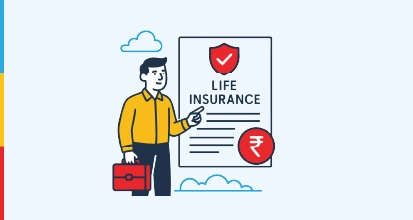2021-02-22
781 Views
Share
An OTP has been sent to your mobile number

Sorry! No records Found
Thank you for your interest in our product. Our financial expert will connect with you shortly to help you choose the best plan.
Life is uncertain, and thus an insurance coverage is essential to deal with any upcoming difficulties in life. Several insurance policies are available in the market, but selecting the best out of these according to one's requirements is based on different factors. Several factors are important to understand and should be kept in mind while planning to buy an insurance policy. Detailed research and knowledge are always beneficial in making the right choice and helps select the best insurance policy.
People often consider choosing between term insurance and a life insurance policy.
There are many aspects by which term insurance and life insurance policy differ from each other. Let's understand some basic differences between the two.
It can be clearly understood by the name itself; term insurance plans are defined as the payment of a premium for a fixed period of time. It covers the risk that might be caused due to premature death. In case of the untimely death of the insured, the policy provider is bound to pay the death benefit amount to the beneficiary.
There is a major plus point of getting term insurance plans; it provides high coverage at low premiums. So, even in your absence, your family's financial requirements can easily be fulfilled as you are assured to avail a high sum.
Life insurance plans help you get financially secured and safe. In case of premature death, the financial loss suffered by your family can be compensated with life insurance. For example, there are child insurance plans that help in shaping your child's future. Likewise, there are pension plans which promise you a handsome amount lifelong and keep your old age in safe hands. Therefore, life insurance plans can be found in every stage of life to provide you financial safety.
Life insurance has many varieties, and these together constitute several types of life insurance plans. Among these different types, term insurance plans are also one. Generally, people get confused and compare term insurance with other types of life insurance plans.
Aside from term insurance, some other life insurance plans include,
So, why should one invest in insurance? The main reason to buy insurance is to hedge a health risk. These risks may be uncertain and thus require a huge amount of money. Health risks include cancer risk, organ failure, any unexpected illness, or accident. o There is a monetary cost to this risk, and thus, buying term life insurance may payout for these risks. It may also alleviate potentially higher financial costs.
The most prevalent health risk that one hopes to alleviate is premature death, and if the insurer passes away prematurely, his/her dependent has to bear the financial burden and the loans that the family owes. Hence, to prevent these types of situations, one should buy insurance.
The amount of coverage of an insurance policy or the death benefit of the policy should be enough to replace the after-tax income that the insurer would have earned if he/she had lived a full life. The insurance replaces the income that the insurer didn't have the chance to earn by living and working until retirement due to his/her premature death.
The insurance should cover the proper amount that will allow the family of the insurer to continue their lifestyle. The actual amount of the insurance depends on the present and the probable future incomes and the existing budget for premiums.
Listed below are some basic and common differences between term and life insurance plans. Look carefully at the points below to choose the best insurance policy for yourself.
Coverage
Term insurance plans only provide coverage in case of premature death of the policyholder within the period of the policy, whereas a life insurance policy is a dual benefit for its owners. It provides both deaths as well as maturity benefits to the insured. It is a sort of investment that has multiple benefits.
Although, the sum you avail at the expiry of life insurance is much lower than the amount that is benefited from term plans in the form of death benefits. Many insurance buyers prefer buying life insurance policies due to the dual benefit it provides, but it is recommended to always buy at least one term insurance as you get a high sum at low premiums as compared to the life insurance plans.
Flexibility
In some aspects, term insurance plans can turn out to be firm and inflexible as they don't provide any paid-up or capitulated amount and also don't possess any maturity benefits. In comparison to this, life insurance plans are easy to avail.
Also, the ethnicity of term plans turns out to be beneficial as you are assured with the paid-up and a capitulated amount. You can also get the benefits of policy loans under such plans. Also, when you go for ULIPs, you can debit partially, change, or pay additional premiums.
Bonus and other benefits
There are no such benefits like incentives or any other kind of addition under term insurance plans. If there is a case of death, the assured amount or value is paid. Many other types of life insurance plans, like an endowment, money back, or child plans, provide you with bonus additions, loyalty additions, guaranteed additions, etc. Furthermore, these additional things involved in the policy increases its benefits and usage.
Capitulate and end the policy
There are also some other life insurance plans, which offer you some benefits even if somehow the premium gets ceased or gets closed due to some reason. If your premiums get discontinued, and you have reimbursed the premium for a specific year's count. Still, you can enjoy its benefit as your policy would be paid-up.
Under this paid-up policy, the total amount will get reduced, but your policy would still be active. Whenever you want, you can choose to bring that policy to an end by closing it. Moreover, when it gets closed, you will be rewarded with the capitulated amount.
Tax Benefits
Sometimes, a misconception arises among people that an individual will be benefited more against the taxation under 80C of the Income Tax Act for the premium which is paid for a life insurance policy even if they are having a high amount of premiums. Along with this, there is also one misconception where people misunderstand that the maturity benefit they will receive is also tax-free.
Moreover, it is important to understand and note down that the premium has to be paid for the term life insurance needs not to be in less amount. It is also eligible for tax deduction under section 80C of the Income Tax Act. So, if it is like that, someone wants to get engaged or invest in any insurance plan to avail or enjoy the tax benefit, then they can opt to invest in any term plan.
Premium amount
If any individual wants to enjoy more coverage over a life insurance policy, then they need to pay a larger amount of premium value. Furthermore, because of a high premium, a large number of insurance buyers are not able to avail proper coverage over it. The return of investment from this policy ranges between 5-7% and gets lower if one exits the policy in the middle. The amount which is associated with the administration also significantly reduces the returns.
In contrast to it, the term insurance plans turn out to be more cheap and easy to buy and thus, is proved to offer more coverage at a low amount. For instance, if a person is 35 years old and wants to get term insurance of Rs.20,00,000 for 20 years, then he is liable to pay an annual premium of Rs. 6000.
In comparison to this, a without-profit endowment policy with a similar death benefit will have an annual premium of 60,000 along with a profit endowment policy that will cost about Rs.1,00,000 per annum.
Therefore, the term insurance plans turn out to benefit more to those people who are not financially strong and cannot afford much for their family, or they don't have a stable source of income and proper job security.
It is crucial to understand that investing in life insurance helps build a strong financial future. Different people have different outlooks towards choosing an insurance policy, but to own both life insurance and term insurance at the same time can be really helpful. One plan has dual benefits of investment as well as life protection, while the other provides financial security to your family by paying a minimal premium. All the points mentioned above can be of great help in selecting the best insurance policy that matches your needs and expectations.
Disclaimer - This article is issued in the general public interest and meant for general information purposes only. The views expressed in this blog are solely those of the writer and do not necessarily reflect the official policy or position of Canara HSBC Life Insurance Company Limited or any affiliated entity. We make no representations or warranties of any kind, express or implied, about the completeness, accuracy, reliability, suitability, or availability with respect to the blog or the information, products, services, or related graphics contained in the blog for any purpose. Any reliance you place on such information is therefore strictly at your own risk. You should consult with a qualified professional regarding your specific circumstances before taking any action based on the content provided herein.
We bring you a collection of popular Canara HSBC life insurance plans. Forget the dusty brochures and endless offline visits! Dive into the features of our top-selling online insurance plans and buy the one that meets your goals and requirements. You and your wallet will be thankful in the future as we brighten up your financial future with these plans.




